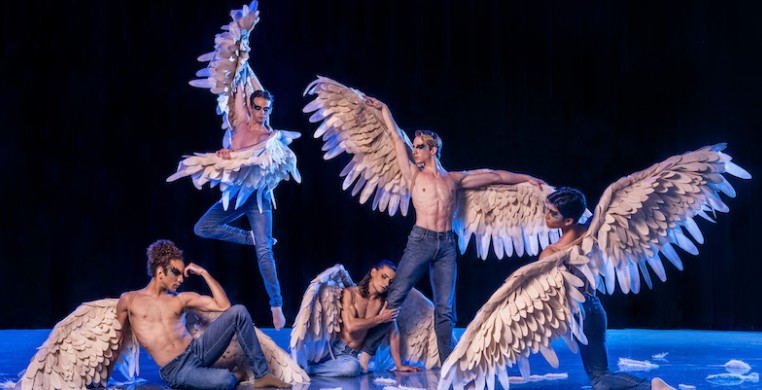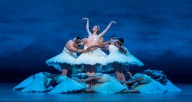The chariot may be swinging low, but it isn’t all sweet in choreographer Chanel DaSilva’s premiere, “Swing Low,” inspired by the lyrics to the famous spiritual, “Swing Low, Sweet Chariot,” and live-streamed Friday, May 28, on the Joffrey Ballet’s Studio Series. Being carried “home” by a team of four buff male angels was, in fact, a flight with plenty of turbulence for lead dancer Fernando Duarte.
“Swing Low,” opens with Duarte’s inanimate body collapsed on the floor. White feathers float down and scatter on and around him. Stray birds molting? Death? Where are we? Some otherworldly wilderness between Earth and heaven? But then a breath; he stirs, awakening, as if from a dream, to encounter himself. He slowly unfolds, bird-like, his arms angled and inquisitive like wings. He is alternately agitated, confused, searching and beseeching, his limbs jarring, then releasing, angular and submissive; his torso twists in spiraling resistance, then surrenders.
The dark celestial weather of composer Zoë Keating’s cello chords wraps around Duarte’s movement as four men with enormous white angel wings emerge from upstage, bare-chested and wearing tight-fitting jeans. They leap, wiggle their hips in unison with predatory swag and arc their legs over him with the sassy dominance of bad boys in the neighborhood.
They surround and breathe him into their fold. Duarte briefly joins their unison ritual, the promise of an initiation, but he resists, then collapses to the floor as the winged men leave. Indecision writhes his torso and the winged men return to drag his limp body into the enclosure of their brotherhood. Dead yet, or merely overcome?
Silence. The energy of a solo cello revives him and thrusts the narrative into the central episode of conflict and transformation. His hips thrust off the floor into prayer and supplication. The men return unwinged. Who are they? Duarte fears them and backs off, but they seize him, toss him about, lift him above themselves in a sacrificial rite, tribal and clannish in relentless unison to the plucked strings intensity of Keating’s score. After much group lifting and setting down, joining and separating, they disperse, and the gang leader re-enters fully-winged for a tender duet. A father embracing the prodigal son? The angel of death finally coming to carry him home? There is a brief struggle, then a final submission.
In the third segment, the winged lead angel caresses Duarte, soothes him, gathers him into his arms and carries him “home” to his fellow angels. This transformational passage leads the man into another dimension of reality. It is at once seductive, sexual and triumphant. The man emerges with wings, fully initiated into his new form. It is a death and rebirth to the ostenato cello beat. Their mission complete, the rescue squad marches into eternity while the new initiate crawls after them.
At least that’s the story I made of DaSilva’s intriguing narrative ballet. If movement sequences were occasionally overly repetitive and movement invention limited in its range of vocabulary, it made up for it in contrasting dynamics and riveting drama. But what was at stake for the main lead character?
The Joffrey website characterizes it as an investigation of “…the many complexities of what it means to be human.” DaSilva shows us that it is a struggle to overcome one’s earth-bound limitations in search of flight—of the body, of the heart and of the spirit. The central question seems to be, where, ultimately, is home. “Swing Low”’ answers the question with the journey from the earthly pursuits of ambition and pride to the sublime oneness of creation. What’s at stake? Our humanity.
It’s not often that we are able to experience the unique qualities of male partnering in an entire ballet of male-only dancers. And what a joy! The quintet of Joffrey dancers who tell this story of “I was lost, but now am found,” is rich in dramatic tension and substance. Along with Duarte, dancers Evan Boersma, Hyuma Kiyosawa, Edson Barbosa, and Stefan Goncalvez tell the story with passion and sublime dancing, which is in itself its own heavenly journey.


